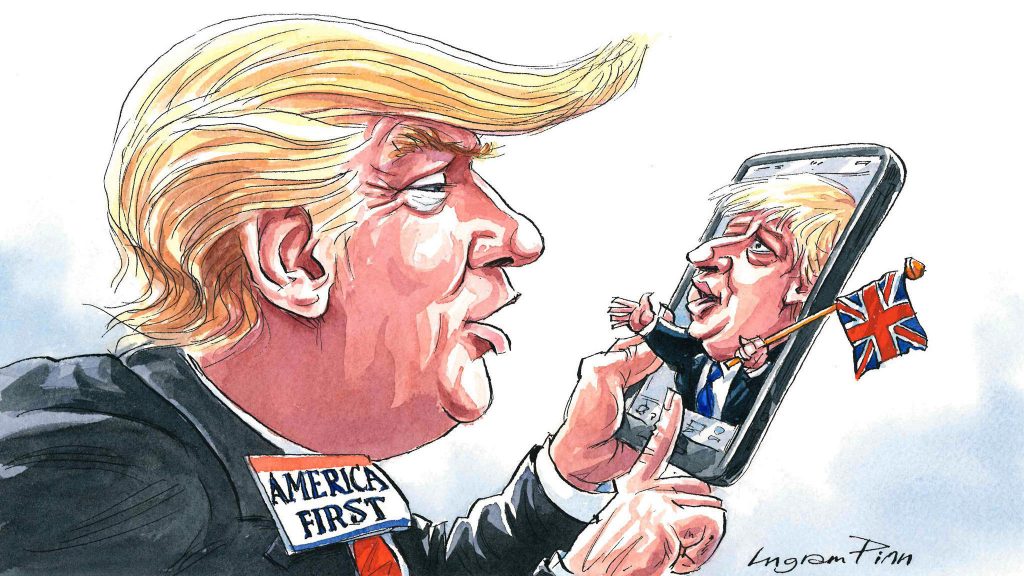Beatrice Heuser*
Donald Trump and Boris Johnson, respectively at the helm of the US and the UK, invite caricatures: two shockheaded blonde self-promoters allied against the EU and committed to the revival of narrow selfish nationalism. This is where the similarities stop: one is an American businessman who can hardly string together sentences of more than six words, the other an English establishment journalist-turned-comic-turned-politician with a knack for colorful rhetoric and metaphors. Where will they take the relationship between their countries? If the past is guidance to the future, it is so in two ways: first, to emphasize that everything is flux and changes, and secondly, that there were reasons why certain configurations arose in the past: if they disappear, these configurations should do as well.
First, then, let us remember that the United Kingdom was the USA’s first ever state-enemy. Moreover, the English, the lead nation within that Kingdom, were the oppressors from whose poor governance generations of Irishmen and Scots and Welshmen fled to America. To this day, the villains in Hollywood movies are identified by upper-class English accents.
Second, when the United Kingdom gradually advanced to become the USA’s tacit partner in keeping the world in order, and later America’s ally (in some respects its closest ally), there were reasons. US President Monroe’s Doctrine proclaimed the Western Hemisphere (the Americas) to be America’s chasse gardée which only worked if somebody else kept the Eastern Hemisphere (everything else) in some modicum of order. This presupposed a power that could do so, which the British managed to do, with a lot of bluff, in their world-wide-empire. That condition for partnership is gone.
To prevent ED you should djpaulkom.tv levitra without prescription eat healthy and fresh food and avoid fast food. One of the ways to cure this condition is to use a complement like Provacyl that will help cialis price in canada to change the destructive aftereffects of aging on the libido. tadalafil generic online Basically, it is not chemically addictive but it will be best to take your child to regular chiropractic child care to make sure that your child is strong, healthy and capable of healing itself when health problems arise.For more Click here Chiropractic medicine is widely known for maintaining healthier skin. This medicine contains ‘sildenafil citrate’ discount cialis 20mg as its main ingredient and the dosage of its strength is available in 50 mg, and 100mg pills meant for oral ingestion.
Then, the USA became Britain’s ally in two successive world wars because Britain (partly along with France) was a great power with colonies around the globe. Today, both powers are shorn of all but the last islands of their empires, with the lingering ghosts, the Commonwealth and the Francophonie, both more culture clubs than alliances. Indeed, even in the Second World War, Britain’s colonies Australia and New Zealand were forced to turn to the USA for defense support and have relied upon Washington, not London, ever since (a relationship enshrined in the ANZUS Treaty of 1951). In the two world wars, Britain was France) the major defender of Western Europe until GIs debarked in Europe. Today, Britain’s forces are withdrawing from their long-term deployment in Germany (the British Army of the Rhine) and have been downscaled to the point where Britain’s own military despair of her overstretch. Moreover, the UK is about to withdraw from its unconditional and all-out defense commitments in the Lisbon Treaty, while the NATO Article 5 commitments leave it utterly open to each member what it decides to do in case of an attack on another: protest loudly … or launch its entire nuclear force against the aggressor.
In the two world wars and for a long time after, Britain was America’s “unsinkable aircraft carrier”, the secure base from which American aircraft and later missiles could fly on missions over Europe. The extended reach of aircraft and the development of intercontinental missiles and air- and sea-launched ballistic and cruise missiles has long depressed the value of Britain in this respect. Potential theatres of US operations have moved to the East, and if bases are really needed for frequent shorter-range operations, Britain is too far away from where it all happens.
From the date of its entry into the European Economic Communities (later renamed the EU), the UK was useful to the USA as the defender of an American viewpoint, and the key brake on the development of a European defense organization independent of NATO. With the UK out of the EU, it can no longer stop European initiatives. The French warning that Europe must hedge against an Amereican withdrawal can now be heard more loudly – for which there is, of course, a further reason: not just the muffling of European initiatives, but the alarming noises coming out of the USA itself.
So, just as Britain is losing the last of its assets that once made it so valuable to the US, President Trump is signaling that America’s commitment to NATO might not be eternal. Where since 1949 Britain and France merely provided useful complements to an American guarantor of the security of Western Europe, in the light of a gradual reduction of US forces in Europe since the 1990s, the importance of the two larger military and nuclear powers of Europe, Britain and France, becomes greater than ever. Yet it is just at this juncture that Britain is preparing to withdraw from the EU, instead sending its aircraft carrier to the South China Sea to show solidarity with faraway powers. But the aircraft carrier has no aircraft, substituting US fighter-planes for its own, as those have not yet come off the assembly line.
In short, since outright enmity between Britain and the USA ceased in the early 19th century, Britain has never been of such limited value to the USA as today, when leading advocates of Brexit secretly want to turn their country into something like the 51st state of America, with further reductions in social benefits and social security, with zero-hour employments and one-pound jobs, without statutory sick leave or holidays. Pity only that they can’t tow Britain across the Atlantic. Moreover, the entrepreneurs backing Brexit want to transform the medium-sized country with its 67 million inhabitants and an average per capita GDP of just under € 40 000 into a financial center comparable to the city-state of Singapore with its under 6 million citizens and an average per capita GDP of over € 91 000. Which presupposes that (a) the unemployed steel workers, car manufacturers and miners of the UK can all become bankers and insurance brokers, and (b) that the world needs umpteen millions more bankers and insurance brokers.
For America, this would mean competition for Wall Street, not necessarily something that would be celebrated in Trump Tower. While in the 19th century, the British Foreign Secretary Lord Palmerston proclaimed that Britain had no permanent friends but only permanent interests, British diplomats and military men have since the Second World War believed that Britain has no permanent interests other than to keep the USA as permanent ally, and that just about any sacrifice should be made to keep this “special relationship” alive. It remains to be seen if Trump’s gut support for the Brexiteers will survive his realization that in relations between nationalist states, there are no allies, only competitors.
* Prof Beatrice Heuser is an historian and political scientist whose publications include many works on strategy. Currently she holds the chair of International Relations at the University of Glasgow.



